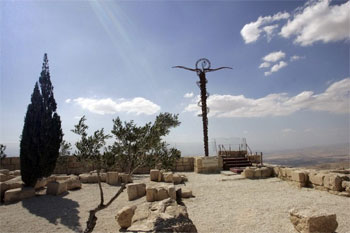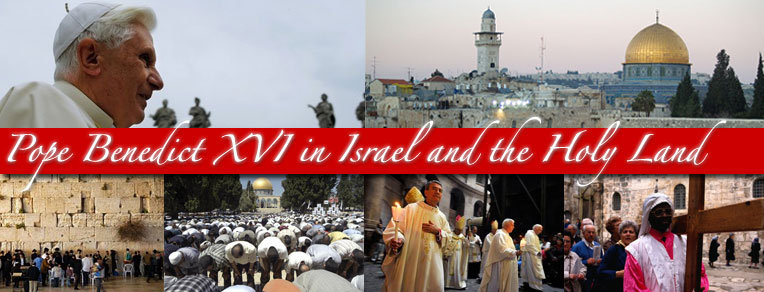- Father Caesar Atuire, the delegate administrator of Opera Romana Pellegrinaggi, calls the first day of Pope Benedict's visit to Jordan a success (Zenit News):
This trip is important, Father Atuire said, "because he is arriving in a moment in which this land is trying to find a way of living in peace among the various peoples and the Pope truly arrives as a pilgrim of peace." ...
Father Atuire affirmed: "This trip has begun very well with a lot of serenity -- because as always, before all of the Pope's trips, there are a lot of worries, there is a lot of conflict that some people want to stir up. But what we have seen is that the Pope has arrived truly as a messenger of peace.
"He has been welcomed by the people, by the Muslims, by the king who is Muslim, by his family. And he has also wanted to begin his visit visiting the poor, society's most marginalized, and I think this has given a very good start to this trip."
- Zenit News Service interviews Fouad Twal, patriarch of Jerusalem, on the importance of Pope Benedict XVI's visit for Jordanian Christians:
"I, as a Christian, always say that I am Arabic, Jordanian and Christian," he explained. "We Christians make up 3% [of the population of Jordan], Catholic are 1.5%. We see in this visit a support for the presence of Christians, we who've been here 2,000 years.
Twal spoke also of the Pope's plan to bless the cornerstones of two churches on the banks of the river Jordan. [More]."The visit is also important because it has brought about the meeting of the Pope with the king and queen, with the leaders of the Muslims, and this is decisive to speak about existing together, about human elements, not dogmatic ones: themes that affect this region of the Middle East, which is always in conflict."
- Marie-Ange Siebrecht, regional specialist of Aid to the Church in Need, thinks that Benedict XVI's visit to the Holy Land is inspiring a lot of hope, even perhaps too much:
She noted that not every Christian will have the opportunity to see the Pontiff, especially the people of Gaza and Bethlehem. Many people, she said, "will not get permission to attend the big Masses in Nazareth and Jerusalem."
The aid worker observed that during her visit, she saw and heard many people expressing hope "for a great deal from this papal visit, possibly even too much." She added, "For the Pope certainly won't be able to solve all their problems."
[...]
"But what can he really hope to achieve with regard to the bigger picture? He will hardly be able to tear down this terrible wall through his visit, or even resolve the problems that exist between the Vatican and the state of Israel. But it is already an important sign that he is coming at all." [More]

- John Allen Jr. take a closer look at Muslim-Christian relations in Jordan and finds things are not what they seem -- even in a "moderate Islamic nation" where, according to Pope Benedict, "the predictions of those who consider violence and conflict inevitable" (National Catholic Reporter May 9, 2009):
“I hear about conflict between Muslims and Christians on the news, but I don’t see it in my daily life,” [Yazan] Khateeb said. He estimated that “extremist” Muslims in Jordan who might have theological or political axes to grind with the pope or with Christianity represent “a small group, no more than twenty percent.”
Yet ask Khateeb how he would react if his Muslim sister wanted to marry a Christian man, and the picture changes slightly.
“I would have a problem with it,” he said. He quickly added that it’s not because he objects to Christianity, but because he knows how people would react. Family members would be angry, neighbors would gossip, and life in general would be difficult for his sister.
In a similar vein, Khateeb also said that any Muslim in Jordan who might want to convert to Christianity would run into “real problems.” When asked how many of his Muslim friends would agree with Benedict XVI that religious freedom is a fundamental right – which implies that a Muslim ought to be free to convert, his blunt answer was “no one.”
- On a similar note, Los Angeles Times' Jeffrey Fleishman interviews a Jordanian Christian, whose story paints a tense picture of Christian-Muslim relations:
"You know, coexisting with Muslims is difficult," he says, choosing his words so as to convey truth but not offend. It is the way of conversation here, to let nuance reach the heart. "Muslims don't accept others. They want everyone like them. We show them friendship. They don't show outward hostility, but you feel it inside your soul."
"Devotion to the land is rooted deeper in the soul than religion," says Fleishman, "tribes from this country -- no matter their creed or enmities -- unite against a common outside enemy."In 1950, Christians made up about 30% of the Jordanian population. That's dropped to less than 4% in this overwhelmingly Islamic nation where Jesus was baptized and Moses was buried. Most Christians, like Hattar's brother and four sisters, left for better opportunities in Europe, the U.S. and Canada. Holding on to tribal lands is approached with more sanctity than taking Communion; when a Palestinian recently bought property on the hillside, Hattar went down to make sure his new neighbor had the New Testament, not the Koran.
"This is my land, olives, figs and grapes," he says. "The pope doesn't understand the complexities of the region. But I'm a Catholic, so I defend him. He won't be around forever."










No comments:
Post a Comment